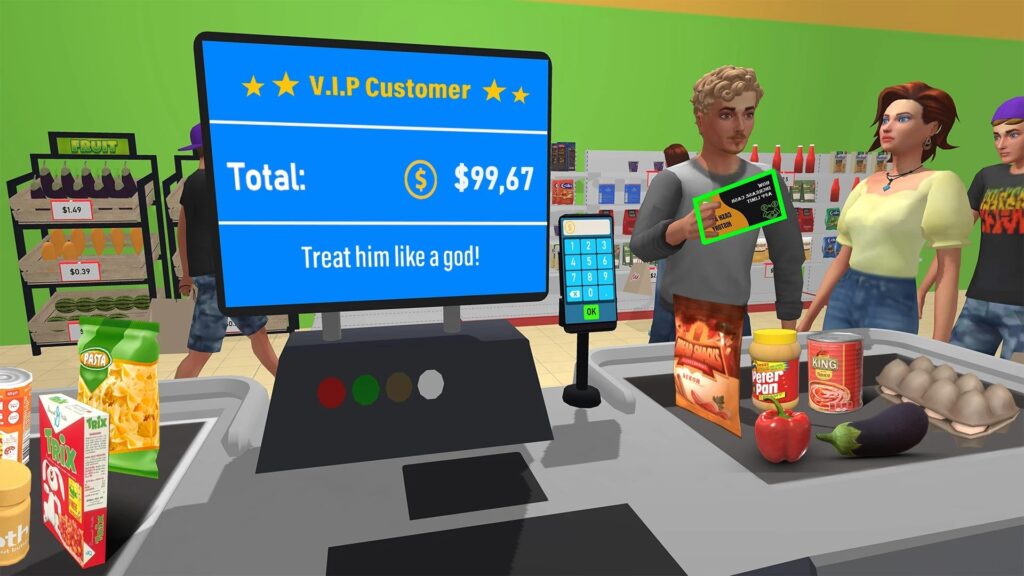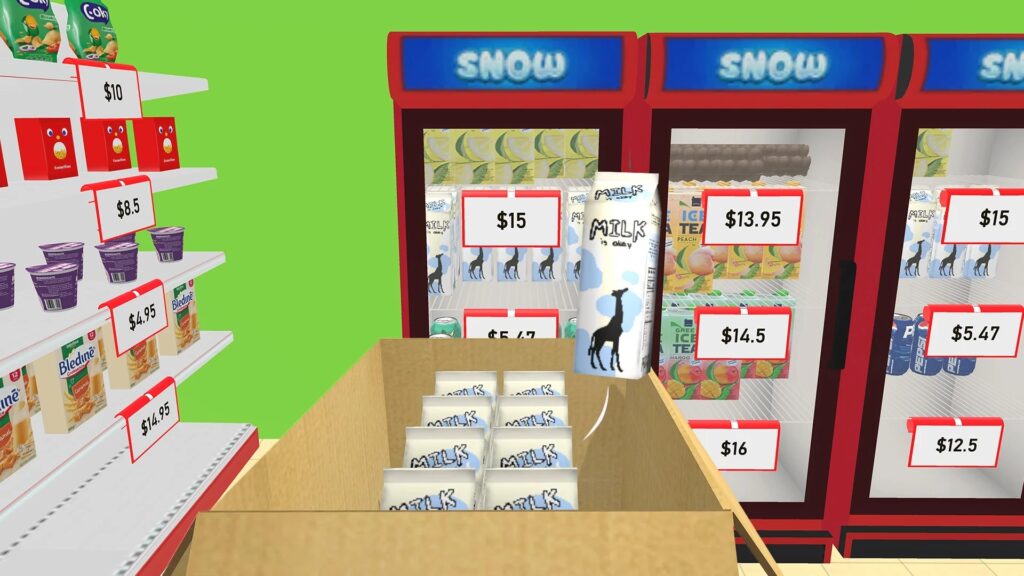My Supermarket: Simulation 3D offers players the exciting challenge of managing a virtual supermarket. From stocking shelves to balancing budgets, this game requires strategic thinking and efficient management. This guide will provide you with essential tips and strategies to excel in My Supermarket: Simulation 3D, ensuring your supermarket becomes a thriving business.
Introduction
In My Supermarket: Simulation 3D, players must manage every aspect of running a supermarket. Success depends on your ability to make strategic decisions, manage resources effectively, and keep customers happy. Whether you’re a new player or a seasoned manager, this guide will help you navigate the complexities of the game and maximize your supermarket’s potential.

The Basics of My Supermarket: Simulation 3D
Before diving into advanced strategies, it’s essential to understand the basic mechanics of the game. Players must manage inventory, staff, finances, and customer satisfaction to build a successful supermarket.
The Importance of Strategy
Strategic planning is crucial in My Supermarket: Simulation 3D. Each decision you make can significantly impact your supermarket’s performance, making it essential to think ahead and plan carefully.
Effective Store Layout
A well-designed store layout can enhance customer experience and boost sales. Here are some tips to create an efficient and attractive supermarket layout.
Optimize Traffic Flow
Ensuring smooth traffic flow is essential for customer satisfaction. Arrange aisles and product displays in a way that minimizes congestion and makes it easy for customers to find what they need.
Tips for Traffic Flow:
- Wide Aisles: Keep aisles wide enough to accommodate multiple customers.
- Clear Signage: Use clear signage to guide customers through the store.
- Strategic Placement: Place popular items in easy-to-reach locations to prevent bottlenecks.
Product Placement Strategies
Effective product placement can significantly impact sales. Position high-demand and impulse-buy items in prominent locations to encourage purchases.
Product Placement Tips:
- Eye-Level Displays: Place high-margin items at eye level to attract attention.
- End Caps: Use end caps for promotions and special offers.
- Grouping: Group related products together to encourage additional purchases.
Inventory Management
Managing inventory efficiently is crucial for maintaining stock levels and preventing waste. Here are some strategies to optimize your inventory management.
Automated Reordering
Set up automated reordering for essential items to ensure your shelves are always stocked. This will save time and prevent stockouts.
Automated Reordering Benefits:
- Consistency: Maintain consistent stock levels without manual intervention.
- Time-Saving: Free up time for other management tasks.
- Customer Satisfaction: Ensure customers always find the products they need.
Stock Rotation
Practice stock rotation to minimize waste and keep your inventory fresh. Use the FIFO (First In, First Out) method to ensure older products are sold first.
Stock Rotation Tips:
- Labeling: Clearly label products with arrival dates.
- Regular Checks: Conduct regular checks to rotate stock appropriately.
- Discounts: Offer discounts on items nearing their expiration date to encourage quick sales.
Financial Management
Effective financial management is essential for the success of your supermarket. Here are some tips to manage your finances efficiently.
Budget Allocation
Allocate budgets for different departments to ensure balanced spending. Monitor expenses and adjust budgets as needed to maintain financial stability.
Budget Allocation Strategies:
- Department Budgets: Set specific budgets for inventory, staff, marketing, and maintenance.
- Expense Tracking: Regularly track expenses to stay within budget.
- Adjustments: Adjust budgets based on performance and seasonal trends.
Profit Analysis
Analyze profit margins to identify profitable products and areas for improvement. Use this information to make informed decisions and optimize your product range.
Profit Analysis Tips:
- Regular Reviews: Conduct regular profit reviews to monitor performance.
- Focus on High-Margin Items: Prioritize stocking and promoting high-margin products.
- Cost Control: Identify and reduce unnecessary costs to improve profitability.
Staff Management
Your staff plays a crucial role in the success of your supermarket. Here are some strategies to manage your team effectively.

Efficient Scheduling
Create efficient schedules to ensure adequate staffing during peak hours and avoid overstaffing during slow periods.
Scheduling Tips:
- Peak Hours: Identify and prioritize staffing during peak shopping times.
- Flexibility: Offer flexible schedules to accommodate staff availability.
- Cross-Training: Train staff to handle multiple roles to improve flexibility.
Ongoing Training
Invest in ongoing training to improve staff performance and customer service. Well-trained employees can enhance the shopping experience and boost sales.
Training Strategies:
- Customer Service: Focus on customer service training to improve satisfaction.
- Product Knowledge: Ensure staff are knowledgeable about products and promotions.
- Regular Updates: Provide regular training updates to keep staff skills current.
Enhancing Customer Satisfaction
Keeping customers happy is essential for repeat business and positive reviews. Here are some tips to enhance customer satisfaction.
Personalized Service
Offer personalized service to make customers feel valued. This can lead to increased loyalty and repeat business.
Personalized Service Tips:
- Customer Feedback: Actively seek and respond to customer feedback.
- Tailored Promotions: Offer personalized discounts and promotions based on customer preferences.
- Interactive Staff: Train staff to engage with customers and provide personalized assistance.
Loyalty Programs
Implement loyalty programs to reward repeat customers and encourage them to shop more frequently.
Loyalty Program Ideas:
- Points System: Offer points for every purchase that can be redeemed for discounts or rewards.
- Exclusive Offers: Provide exclusive offers and promotions for loyalty program members.
- Special Events: Host special events for loyal customers to enhance their shopping experience.
Marketing and Promotions
Effective marketing and promotions can attract new customers and boost sales. Here are some strategies to market your supermarket successfully.
Social Media Marketing
Leverage social media platforms to promote your supermarket and engage with customers.
Social Media Tips:
- Regular Posts: Keep your social media profiles active with regular posts.
- Customer Engagement: Interact with customers through comments and messages.
- Promotions: Use social media to announce promotions and special offers.
In-Store Promotions
Run in-store promotions to encourage customers to make additional purchases and increase sales.
In-Store Promotion Ideas:
- Buy One Get One Free: Offer BOGO deals to attract customers.
- Limited-Time Discounts: Run limited-time discounts to create urgency.
- Product Demos: Host product demos to showcase new or popular items.
Utilizing Technology
Technology can streamline operations and improve efficiency. Here are some ways to incorporate technology into your supermarket management.
Point of Sale (POS) Systems
Invest in a reliable POS system to manage transactions, track sales, and gather valuable data.
POS System Benefits:
- Efficiency: Speed up the checkout process and reduce wait times.
- Data Collection: Collect sales data to analyze performance and make informed decisions.
- Inventory Management: Integrate with inventory management systems for real-time stock updates.
Customer Relationship Management (CRM)
Use CRM software to manage customer relationships and improve service.
CRM Tips:
- Customer Profiles: Create detailed customer profiles to offer personalized service.
- Feedback Tracking: Track customer feedback and address issues promptly.
- Marketing Automation: Automate marketing efforts to reach customers with personalized messages.
Keeping Up with Trends
Staying up-to-date with industry trends can give you a competitive edge. Here are some tips to keep your supermarket relevant and appealing.
Trend Research
Regularly research industry trends to identify new opportunities and stay ahead of the competition.
Research Strategies:
- Industry Reports: Read industry reports and publications to stay informed.
- Competitor Analysis: Analyze competitors to identify successful strategies.
- Customer Surveys: Conduct customer surveys to understand their preferences and expectations.
Innovation and Adaptation
Be open to innovation and willing to adapt to changing market conditions.
Innovation Tips:
- New Products: Introduce new products and services to attract customers.
- Technology Adoption: Embrace new technologies to improve operations and customer experience.
- Feedback Implementation: Implement customer feedback to enhance your offerings.

Community Involvement
Engaging with the local community can build strong relationships and enhance your supermarket’s reputation. Here are some ways to get involved.
Local Partnerships
Partner with local businesses and organizations to create mutually beneficial relationships.
Partnership Ideas:
- Local Suppliers: Source products from local suppliers to support the community.
- Community Events: Sponsor or participate in local events to increase visibility.
- Charity Initiatives: Support local charities and community initiatives.
Customer Engagement
Engage with your customers through community-focused activities and events.
Engagement Strategies:
- Workshops: Host workshops and classes related to food and nutrition.
- Customer Appreciation: Organize customer appreciation events to thank loyal shoppers.
- Feedback Sessions: Hold feedback sessions to gather input from the community.

Conclusion
My Supermarket: Simulation 3D offers a rich and challenging simulation experience for players. By following the tips and strategies outlined in this guide, you can optimize your supermarket’s performance, enhance customer satisfaction, and achieve success in the game. Whether you’re managing inventory, training staff, or engaging with the community, strategic planning and effective management are key to building a thriving virtual supermarket.


